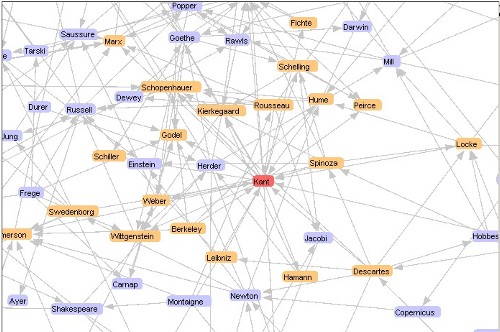August 7, 2006
insight machine: genealogy of influence
Mike Love is working on an interesting project to visualize networks of influence among philosophers, scientists, artists, and architects. He calls it the "genealogy of influence" and it's pretty thought provoking. Mike has been mining wikipedia and classic texts to discover the landscape of interconnection among these scientific, cultural and religious influentials, and he then presents the data in an intuitive and interactive visualization (using prefuse). Even in its early form, I found it a fascinating and mesmerizing way to browse the connection space of intellectual and cultural development. At some point I suspect the nodes (and links?) will be live hyperlinks back to source material, which will make it a very rich tool. Mike wants to find a way to open this up to peer production as well, which is where it will get really interesting. I do hope to see this move beyond the usual suspects of DWEM-dominated intellectualism as well ;-)

My other reaction to seeing this is it would be a perfect interface for the insight machine for American politics. Imagine all of the amazing and detailed information compiled by sunlight, votesmart, rightweb, TPM and others, instantly viewable on a map that is continuously updated by a distributed army of investigative reporters.
There's something big here.
June 29, 2006
stormy brains thinking big thoughts
Ross Mayfield is at the Fortune Brainstorm conference, and he passes along a set of weighty questions that the attendees are asked to respond to. Here's me:
What is the most pressing problem to solve?
Tough to pick just one, but preventing the breakdown of global civil society ranks high on my list. There are several threats to this outcome that could play out in the near term, these are relatively low probability but high impact events. Pandemic disease, rapid rise in sea levels, climatic instability, NBC terrorism, critical loss of biodiversity.
Your biggest fear?
Governments (especially the USA, China and south/east Asia in general) will inadequately prepare for these events and thus fail to maintain social order / Governments (especially the USA) will sacrifice core ideals of liberty in the name of safeguarding the social order.
Three global leaders who will set next decade's course?
A decade isn't very long, and world events have long time constants. Dubya has set a lot of wheels in motion that will be spinning for years. Hu Jintao. Possibly Bill+Melinda, although I'm probably being too optimistic.
Your most cherished value?
Justice. TANJ, unfortunately.
Jurvetson's answer to the last one is priceless.
May 24, 2006
the portrait of infinite regression
This is pretty neat (requires shockwave plugin, but worth the wait).
April 8, 2006
ce n'est pas une advertisment
Mycroft is an interesting experiment in mobilizing the distributed brainpower of web surfers to do useful work in microchunks. In its current incarnation, it looks a lot like a banner ad network, except that you interact with it on the hosting site. For example:
The idea is that people who contribute by solving these little puzzles will get incentive prizes, hosting sites will get a cash bounty, and people with large, tedious parallelizable workloads that need human processing, will pay to get the collective eyes of the web on their problems. It seems like a pretty good idea, I hope it can succeed.
I do wonder how Mycroft will ensure high quality and accuracy; presumably they will have some statistical (and linguistic?) models for sorting out distributions of answers from a sufficiently large set of responses. And I hope they are planning to try some different graphical formats, as the current banners look so much like ads and would seem too easy to ignore.
[via Future Now]
March 31, 2006
apparently prayer doesn't help heal people
Predictable, but still a bit disappointing: Praying for other people to recover from an illness is ineffective, according to the largest, best-designed study to try to examine the power of prayer to heal strangers at a distance.
The study of more than 1,800 heart bypass surgery patients found that those who had other people praying for them had as many complications as those who did not. In fact, one group of patients who knew they were the subject of prayers fared worse.The long-awaited results, the latest in a series of studies that have failed to find any benefit from ''distant" or ''intercessory" prayer, came as a blow to the hopes of some that scientific research would validate the popular notion that people can influence the health of people even if they don't know someone is praying for them.
The researchers cautioned that the study was not designed to test the existence of God or the benefit of other types of prayer, such as praying for oneself or at bedsides of friends or relatives. They also did not rule out that other types of distant prayer may be effective for other types of patients.
It's kind of sad actually, that it is so hard to find magic in the world anymore. Well, other than the basic stuff like existence, I mean.
UPDATE: Shocking, just shocking...


